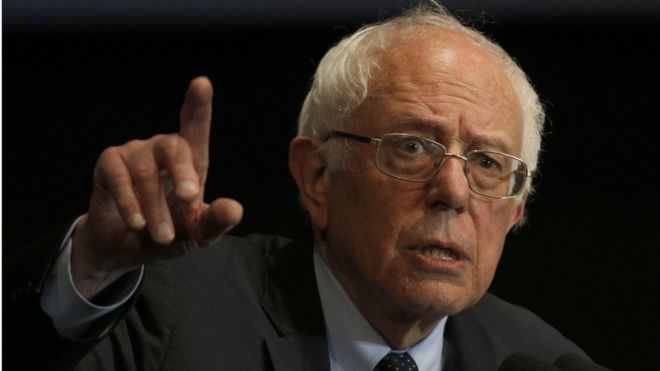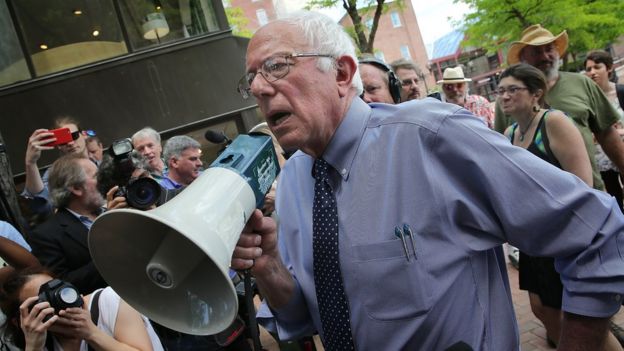Bernie or Bust?
There it was on my Facebook feed. An image of a young woman and beneath it the slogan, “Bernie or Bust.” Catchy enough, I thought. But what does it mean? Two very different interpretations came to mind.
One is that Sanders’ supporters are going all out, taking his campaign as far as it can go (and it’s gone further than many political observers thought only a few months ago), but no matter who wins the Democratic Party nomination this summer, supporting the nominee in the fall.
The other is that it’s full speed ahead now, but in the event that Bernie doesn’t win the nomination and Hillary does, his supporters will sit out the general election.
If the first interpretation is the case, so much the better; it’s a win-win. If it’s the other, it’s wrongheaded. Nothing good will come from it. In fact, a lot of bad could result. Let me explain:
Hillary isn’t Bernie; no question about that. His positions go beyond the conventional boundaries of the Democratic Party; hers don’t. His campaign feels transformational; hers doesn’t. He is energizing new constituencies and stimulating new thinking; she isn’t. He’s on the outs with the party’s hierarchy; she’s its favorite. He hopes to build a popular movement that will endure after the curtain falls on this election cycle. She has no such aspiration. And he’s a democratic socialist to boot. Not her cup of tea.
But, by the same token, Hillary isn’t Trump, Cruz, or Rubio either. Far from it. Nor is she in the same ballpark as Margaret Thatcher or Carly Fiorina, or Sarah Palin or Michele Bachmann.
To say that she is a warhawk, a late arrival to the issue of income inequality, and linked to Wall Street, tells us something about her, something important, but it doesn’t tell us everything. Her politics, much like President Obama’s, are more complex and multidimensional than her unrelenting critics on the left and right allow.
In sharp contrast to her Republican adversaries, Hillary has a democratic sensibility and commitment, even if hemmed in by her centrist politics and class leanings. She may not want to break up banks too big to fail, or rein in U.S. military presence and activity worldwide, or embrace single-payer health care (arguably for good reasons), but she will fight for the full range of democratic rights, collective bargaining rights, wage rights, job rights, women’s rights, civil rights, gay rights, voting rights, immigrant rights, and, not least, health rights, as well as defend the integrity of democratic structures, governance, and traditions.
If elected president she will build on the achievements of Obama’s presidency. In other words, her White House will press for economic, social, and political reforms on a range of issues, including existentially necessary action on climate change. This will be especially so if the progressive and popular base of the coalition that elects her, assuming for the moment that she is the nominee, remains engaged in the post-election period. That wasn’t the case in the Obama years, at least on the scale necessary to successfully combat Republican obstructionism.
Even Hillary’s foreign policy, while likely more aggressive and military-inclined than Obama’s, also has a place for diplomacy, global cooperation, and realism, a far cry from any of the trigger-happy Republican candidates who believe there are no limits to the projection of U.S. power in a complex, fractured, and violent world.
Finally, the election of Hillary will break perhaps the biggest glass ceiling for women. While we can’t really know how great its symbolic significance will be, it is safe to say that it will be large and lasting on men as well as girls and women. Moreover, as president, Hillary will certainly do what she has long done, shine a light on women’s concerns, ranging from wage and job discrimination, to health care, abortion, and birth control rights, to rape and domestic violence, to child care and parental leave. But she will do it on the largest public stage and with a far bigger voice.
The GOP candidates, on the other hand, have no such sensibilities and commitments. Neither does the Republican Party as a whole. They have demonstrated by words and deeds that they think too much democracy, too much equality, and too many democratic rights plague the country. And if it were not for Obama in the White House for the past eight years, their “scorched earth” assault on this plague of excessive democracy and equality would have been much further along.
And herein lies the danger that supporters of both Bernie Sanders and Hillary Clinton must consider: If the Republicans win the presidency, that firewall against far-right extremism that the Obama administration represented will disappear and the barbarians will be no longer at the gate, but likely in charge of the whole castle.
Their grip on the Supreme Court is already secure and the odds are good that if they win the presidency, the presidential coattails will be long enough to maintain their congressional majority.
This doesn’t mean that fascism is around the corner. (More about that in another article). But it will mean that a nasty and brutish gang will use its control of the three main branches of government to roll back the democratic rights revolution of the last 60 years and knee cap democratic governance, not to mention ramp up militarism, climate change obstructionism, and the wholesale shrinkage of the public sector.
To make matters worse, this concentration of state power in the hands of the extreme right at the federal level is matched and augmented by its control of thirty state governments, ubiquitous voice in the major media, network of well-funded think tanks, pastors in the pulpits, energetic grassroots constituency, and nearly bottomless war chest, thanks to the Koch brothers and other right wing billionaires.
Which brings me back to the slogan “Bernie or Bust.” If too many interpret it to mean Bernie or no one, least of all Hillary, it becomes an action (or inaction) that could well cede the country to right wing extremists.
By the same token, much the same could be said if Hillary’s supporters, and there have been hints, go on strike in the event that Bernie wins the nomination.
Does anyone really want to repeat the debacle in 1972 when major sections of the Democratic Party sat on their hands rather than support the party’s nominee, the anti-war liberal, George McGovern? We got Nixon and Kissinger then; we will get worse now.
Unity around the eventual winner, not division, not sitting on one’s hands, is, therefore, imperative.
This may not sound sexy. It isn’t a leap down freedom road. It’s more defensive than transformational. The framing of the present situation and tasks in this way isn’t an end point of analysis or struggle. Instead, it’s a necessary way station that can’t be bypassed if we hope to arrive at a future of radical and substantive democracy, equality, sustainability, and peace, a future that is worthy of our humanity.



















